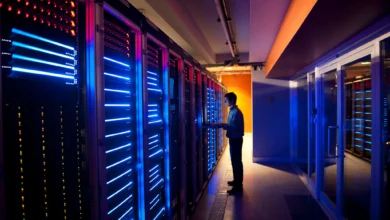The Future of Artificial Intelligence: What Lies Ahead?

Artificial Intelligence (AI) is revolutionizing industries, shaping modern businesses, and transforming how we interact with technology. With rapid advancements in machine learning, deep learning, and automation, AI is becoming smarter and more efficient. But what does the future hold for AI? How will it evolve, and what impact will it have on different sectors?
This article explores the future of artificial intelligence, key trends, challenges, and ethical considerations that will shape the next phase of AI development.
The Evolution of AI: From Basic Automation to Super Intelligence
AI has evolved significantly over the years. Its development can be categorized into three stages:
- Artificial Narrow Intelligence (ANI) – The current stage, where AI performs specific tasks like voice recognition, recommendation systems, and image processing.
- Artificial General Intelligence (AGI) – A future stage where AI will have human-like intelligence, enabling it to think, reason, and adapt across different tasks.
- Artificial Super Intelligence (ASI) – A theoretical stage where AI surpasses human intelligence, leading to advanced decision-making and problem-solving capabilities.
While we are still far from AGI and ASI, AI is evolving at an unprecedented pace, raising questions about how it will impact industries, jobs, and ethical standards.
Key Trends Shaping the Future of AI
1. AI in Everyday Life
AI is already integrated into our daily lives through:
✅ Smart assistants like Alexa, Siri, and Google Assistant.
✅ AI-driven recommendation algorithms on Netflix, YouTube, and e-commerce platforms.
✅ Smart home devices that enhance automation and convenience.
As AI advances, its role will expand, leading to more personalized and efficient user experiences.
2. AI and the Job Market: A Shift in Employment Trends
AI is automating repetitive tasks, reducing the need for human labor in some industries. However, it is also creating new job opportunities in AI development, cybersecurity, and data science. The key challenge will be to reskill and upskill workers to adapt to AI-driven workplaces.
3. AI in Healthcare: Transforming Patient Care
AI is making groundbreaking contributions to healthcare, such as:
🔹 AI-driven diagnostics for early disease detection.
🔹 Personalized medicine tailored to individual genetic profiles.
🔹 Robotic-assisted surgeries for greater precision.
In the future, AI may predict potential health risks before symptoms appear, revolutionizing preventive healthcare.
4. Autonomous Vehicles and AI-Powered Smart Cities
AI is playing a critical role in:
🚗 Self-driving cars developed by Tesla, Waymo, and Uber.
🏙 Smart city solutions that optimize traffic, reduce energy waste, and enhance public safety.
As AI-powered autonomous vehicles become more sophisticated, they will redefine transportation and urban planning.
5. AI in Cybersecurity: Fighting Digital Threats
With increasing cyber threats, AI is being used for:
✅ Threat detection and prevention.
✅ Strengthening network security.
✅ Automating security responses against attacks.
However, AI is also being used by hackers to create advanced cyber threats, making AI-powered cybersecurity solutions more critical than ever.
6. Ethical Challenges in AI Development
As AI becomes more powerful, it raises several ethical concerns, including:
🔹 Bias in AI – Ensuring AI algorithms remain fair and unbiased.
🔹 Data privacy – Protecting user information from misuse.
🔹 Transparency in AI decision-making – Making AI-generated outcomes more explainable.
Governments and tech leaders must work together to establish ethical AI policies and regulations.
Also Read: Ransomware Protection Tips: How to Safeguard Your Business from Cyber Attacks

Will AI Surpass Human Intelligence?
While Artificial Super Intelligence (ASI) remains a distant possibility, AI is evolving rapidly. In the coming decades, we may witness:
🚀 AI working alongside humans instead of replacing them.
🚀 AI-driven scientific breakthroughs and innovations.
🚀 AI becoming more emotionally intelligent, capable of understanding human emotions and behaviors.
The key to AI’s future lies in responsible innovation, ethical AI development, and collaboration between humans and technology.
Conclusion: The AI Revolution is Here
The future of artificial intelligence is full of possibilities, from advancing industries to improving daily life. However, AI’s rapid growth must be balanced with ethical considerations, security measures, and policies that ensure a positive impact on society.
AI is not just a future technology—it is shaping our world today. Businesses, governments, and individuals must embrace AI while ensuring its development remains responsible, secure, and beneficial for all.





One Comment